Dean
1988-1998
Author: walw
Marc Lindenberg
Dean
1998-2002
Sandra Archibald
Dean
2003-2019
Jodi Sandfort
Dean
2021 – present
Evans School Alum Vicki Aken featured for her work in Afghanistan
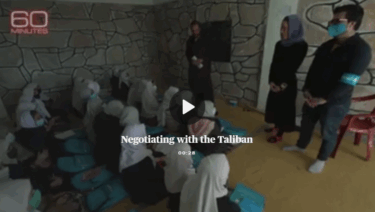
Evans Alum Vicki Aken is featured on 60 Minutes on December 12th in an episode about negotiating with the Taliban in Afghanistan. Vicki is the Afghanistan country director for International Rescue Committee in Kabul, Afghanistan, where she continues to work with IRC staff to delivery programs and to provide support to women and girls.
Overall earnings inequality rises in Seattle, despite higher minimum wage rates
Evidence suggests the Seattle minimum wage law slightly reduced earnings inequality among workers earning at or below the median hourly wage ($26.42), but the minimum wage law did not offset rising levels of earnings inequality across all workers.
Rising income inequality is of mounting concern in major metropolitan areas across the country. In an attempt to address rising inequality in Seattle, proponents of the Seattle Minimum Wage Ordinance argued that higher minimum wages would narrow the earnings gap between the top and bottom of the labor market. In a recent article, “Seattle’s Local Minimum Wage and Earnings Inequality,” University of Washington Evans School faculty Mark C. Long examines the extent to which the city’s minimum wage law might have affected earning inequality in the first few years following passage. Long finds that workers in the lowest paying jobs saw increases in their wages that reduced inequality among workers earning less than the Seattle’s median hourly wage ($26.42). He finds no evidence, however, that Seattle’s minimum wage lowered the overall level of earnings inequality across all workers in the city, which substantially widened during this period.
Event Recap | Dean’s Forum on Race & Public Policy: Moving Racism Front & Center in Child Welfare
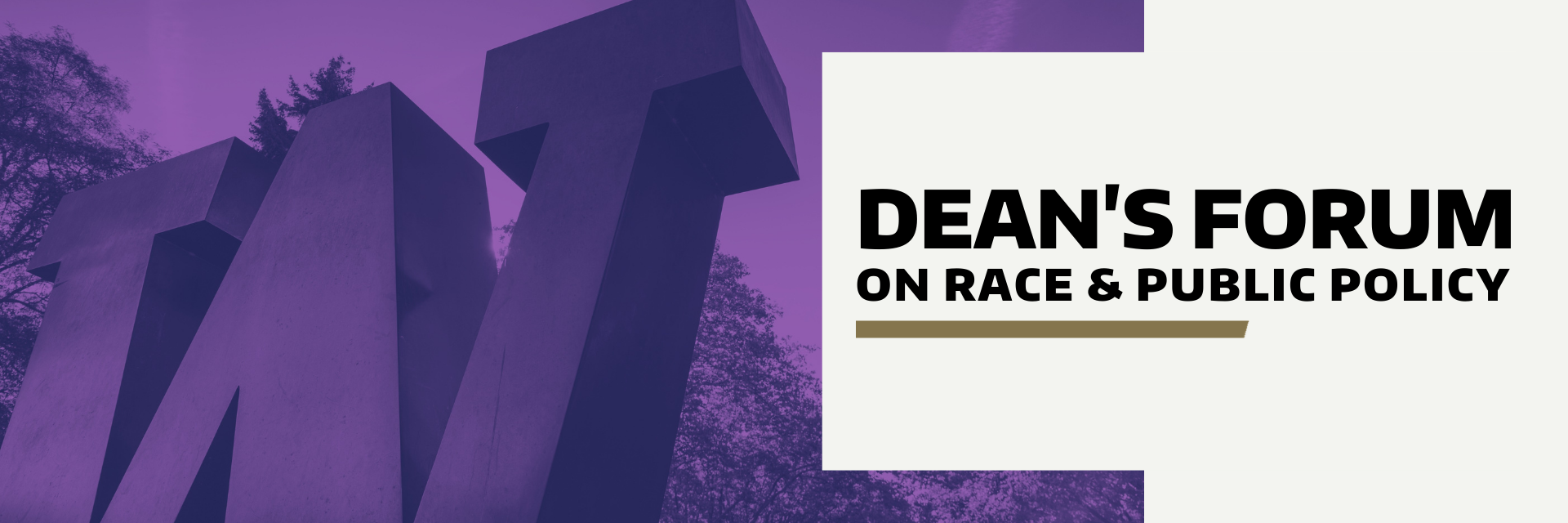
The Dean’s Forum series focuses on the intersection of race and public policy in support of the Evans School of Public Policy & Governance’s mission to host community conversations that inspire public leaders. This event featured a conversation about anti-racism in child welfare policy in partnership with the UW School of Social Work and included Angelique Day, Associate Professor, UW School of Social Work; Alan Detlaff, Dean, University of Houston Graduate College of Social Work; John Edmonds, Supervisor, Olmsted County Community Services; Tessa Evans-Campbell, Associate Dean, UW School of Social Work; and Jodi Sandfort, Dean, UW Evans School.
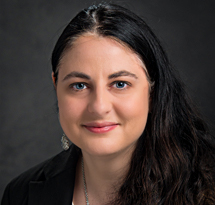
Angelique Day
Associate Professor
University of Washington
School of Social Work
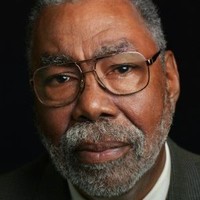
John Edmonds
Supervisor
Olmsted County Community Services
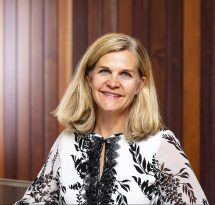
Jodi Sandfort
Dean
University of Washington
Evans School of Public Policy & Governance
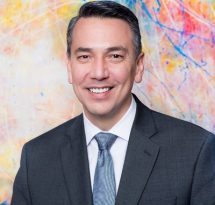
Alan Detlaff
Dean
University of Houston
Graduate College of Social Work

Tessa Evans-Campbell
Associate Dean for Academic Affairs
University of Washington
School of Social Work
Dean Sandfort Speaks to History, Future of Infrastructure Reform
Featuring Dean Jodi Sandfort, a recent episode of Carnegie Mellon University’s podcast Consequential – “Intro to Infrastructure” – looked at the current state of US infrastructure, as well as past and future infrastructure reform.
While infrastructure may have taken center stage in this year’s policy discussions, the United States has ben trying to figure out what to do about our infrastructure for a long time.
“We have been in an era, in the last 70 to 80 years, where we haven’t invested in the physical or social infrastructure from the federal government,” Dean Sandfort explained, “I think that’s why [our nation’s leaders] are realizing that although they have very different political orientations these kinds of basic investments are critical for the country.”
Infrastructure and inequality go hand in hand. There are widespread infrastructure problems that affect every state, but there are certain places and certain populations that feel the brunt of inconsistent investment.
“The short term outcome of the federal government is to provide desperately needed resources in an equitable way throughout the country,” Dean Sandfort continued. “State and local governments have stepped in because there have been no other options, which creates incredible inequities across the country.”
Listen to the episode on Spotify, or wherever you get your podcasts.
Technology and Advancing the Public Good: A Q&A with Mark Frischmuth (MPA ʻ19)
Evans Alum Mark Frischmuth (MPA 2019) believes that technology can help solve challenging social, economic, environmental, and civic problems while empowering all members of society. At DemocracyLab, he is building on that vision by connecting tech-for-good projects with skilled volunteers and socially responsible companies.
What contributed to your decision to pursue a career in support of the public good? Was there a defining moment in particular?
I have always been motivated by a search for meaning and majored in philosophy as an undergraduate. Two sources of meaning I have found are authentic personal relationships and contributing to the public good. A spark of insight the day after the 2004 Presidential election motivated me to explore how technology could be used to crowdsource public policy by mapping connections between the values people believe, the objectives they seek to accomplish, and the policies they would like to see implemented. It was from that exploration process that I formed DemocracyLab in 2006, and it began a long journey that eventually led me to the Evans school and my full-time dedication to advance public interest technology.
Can you share a bit about the work you are currently doing and what a typical day in your work looks like?
DemocracyLab empowers people who use technology to advance the public good by connecting tech-for-good projects with skilled volunteers and socially responsible companies. Our platform and programs help tech-for-good projects to launch without funding, volunteers to upskill and advance their careers, and companies to build cultures of purpose. DemocracyLab is a volunteer-driven organization and thousands of hours of volunteer labor have been contributed toward the research, design, and development of our open-source online platform. I spend time every day coordinating volunteer efforts, engaging with current and prospective partners, reaching out to companies to solicit employee engagement opportunities, and building relationships with prospective funders.
Can you share how diversity, equity, and inclusion are central to your work and the work you continue doing?
Our world and our communities face many very difficult problems. Many of these problems were created by systems that exploited people, land, and resources for profit. I believe that addressing these problems will require the voice, perspective, and talent of as many people as possible. I believe an extroverted culture of inclusion leads to diversity, and that open-minded and respectful teams of diverse people can create communities and products that advance equity. I have experienced much personal privilege in life, and feel a responsibility to use that privilege to create greater equity at whatever scale I can.
If there was one thing you’d want people to know about your work, what would it be?
One of the most important effects of DemocracyLab’s work is that it increases the sense of agency of members of our community. We help people recognize that they have something valuable to contribute to solutions to public problems, and, that their response to these problems is within their control. The infrastructure that DemocracyLab creates has positive impacts on many other problems in society. By activating skilled volunteers and encouraging them to contribute their talents, we make it possible for organizations addressing a host of other issues to pursue their missions more effectively.
Looking back on your Evans School experience, what stands out as being particularly impactful during that time?
While the Evans classroom instruction was invaluable, I found my interactions and conversations with my classmates to be the most impactful aspect of my Evans experience. The diversity of backgrounds, experiences, and perspectives of my classmates helped me better understand my own worldview and challenged me to think more broadly. The education I received at Evans helps me see my work in the larger context of society and to better understand the complex range of stakeholders whose engagement is important to the success of my work.
What are 1 or 2 resources that inspire you personally or professionally?
A book I read long ago that stuck with me is Ken Wilbur’s A Brief History of Everything, where he made some very interesting points about systems thinking. The biggest takeaway for me was that any particular thing can be understood simultaneously as a whole, as a sum of its parts, and as a part of a larger whole.
A Q&A with Rebeca de Buen Kalman (PhD ’21)

This past summer, Rebeca de Buen Kalman completed her Ph.D. at the Evans School, where she focused on the intersections between environmental policy, climate change policy, transportation, and public health. Evans had a chance to sit down with her for a few minutes to talk about her dissertation research.
Your dissertation project is titled, “Pueblos Bicicleteros: Three Essays on Cycling Policy in Mexican Cities,” but you use the evolution of cycling policy in Mexico as a lens into contemporary urban environmental policy. Explain why cycling policy is so central to how major cities address today’s climate challenges.
Transportation is one of the largest and fastest-growing sources of greenhouse gas emissions globally and thus a critical area for climate mitigation policy. Increasing cycling commutes and trips in cities has the potential to reduce emissions and improve and health. Cycling policy can be especially compelling when it is integrated within a larger transportation strategy combined with transit.
Safety and equity concerns, however, must be present as we rethink transit policies. In the cities I studied, most urban cyclists are low-income workers who mostly cycle out of necessity. Framing a bicycle as “one less car” erases the experiences of these cyclists who might perceive the bicycle as a marker of poverty and whose perspective and needs are usually left out of cycling plans.
Why do you think cities in Mexico, as well as in the U.S. and in other places around the globe, struggle to better incorporate cycling within urban transportation strategies?
There are many reasons why incorporating cycling into transportation can be tricky in cities where low cycling rates are the status quo. Most barriers revolve around our current model of mobility, or ‘automobility’, which is centered around the cars and car-centric culture. In most cities, public policies, public spending, and regulations related to street design have historically favored car mobility at the expense of other modes like transit, walking, and cycling, which further entrenches car-centric life-styles. In many places, like the cities I studied in Mexico, some people associate cycling with low economic status and cars with progress and social mobility. Another common cultural barrier relates to society’s tendency to consider bikes as toys or means of recreation, rather than part of the transportation system.
While there are a lot of barriers, there is also a growing appetite from some sectors of the population to move towards multimodal lifestyles that include cycling. Evidence from travel-behavior data reveals an opportunity to reduce car use and substitute cycling for short trips, especially in core urban areas. There also is mounting evidence that younger generations are more environmentally conscious and inclined toward shared and multi-modal transportation when these are available.
We also might not think of cycling policy as a critical element of tackling inequality in modern cities. How does your dissertation show this is anything but the case?
The relationship between cycling and equity is not straightforward. Cycling policy can absolutely be a tool to tackle inequality, but bicycles and cycling policy are not inherently equitable. Bikes are a low-cost and efficient form of getting around in a city. In urban areas like the ones I studied in my dissertation, roughly one-fifth of trips are done by car but the vast majority of public funds for mobility are invested in car infrastructure. Improving cycling conditions through a variety of measures can be a way to improve people’s access to services and opportunities at a very low cost. Improving cycling conditions can also have benefits to pedestrians through improved street design, with important equity implications since riders from vulnerable communities are more likely to be hit by cars as pedestrians.
Measures that are meant to improve cycling conditions, however, are often implemented in visible central city areas and not necessarily accessible to lower-income people who might benefit the most from them. Cycling lanes are frequently implemented on sidewalks or at the expense of sidewalks, limiting pedestrian mobility and accessibility. Sometimes cycling-related policy can even further marginalize cyclists since cycling infrastructure is often determined once motor traffic needs have been prioritized, without addressing the fundamental asymmetry of power that makes cycling unattractive or unsafe.
Readers will be impressed with your research design, which involved the integration of many different data from many different parts of Mexico. How might environmental policy scholars use mixed methods designs to better inform policymaking?
The development of any project related to the built environment is situated in a complex web of actors, institutions, and social processes, where data is often scarce and disperse. I think that mixed methods are crucial for understanding these types of social phenomena. In my dissertation, I studied the trajectories of ten mid-sized and large cities who have implemented cycling infrastructure to different extents. I also took a deep dive into the local social movements that have sparked the adoption of cycling related policies. I used various qualitative and quantitative methods that leverage diverse data sources, including open source and crowdsourced transportation data on infrastructure and travel, administrative data, policy documents, and interview data.
The questions I asked in my dissertation were oriented towards understanding processes and mechanisms rather than questions of cause and effect. To have a full story on each of my cases and parameters that could be compared systematically in my analysis, I had to draw from a variety of sources. I also needed to be through for purposes of validation and triangulation.
Considering the bigger picture, in public policy and management, we ask cause and effect questions because we want to know how interventions impact our desired outcome. But we also need to know how to get things done, the mechanisms at play, and the nuances involved. There is an implementation process between a policy and its effect that requires organizations, institutions, and people. Policy and management are also contextual. We need to draw on various methods to situate ourselves to understand the nuances of public problems and potential policy solutions. Mixed methods are therefore a powerful tool for policy research to become more relevant to policymaking and implementation.
Tell us what you’ll be doing next for your next project at the Evans School.
I am a postdoctoral fellow for Ocean Nexus at the UW EarthLab and the Evans School. Ocean Nexus is an international network of ocean governance scholars based at the UW. Our team at the Evans School works with network members to develop applied policy analysis with an explicit focus on social equity. We are developing a framework to guide the operationalization of equity in ocean governance-related policy analysis through this process. We are also studying how policy problems are discussed in ocean governance research to identify gaps that reduce the applied impact of policy research in this field. Our ultimate goals are to help ocean governance scholars make their research more policy relevant and bring equity to the forefront of policy analysis.